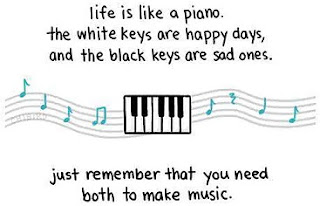Feeling 'bad' can be 'good'...?! Part One
 I'm sure the title of this post sounds rather contradictory, if not outright 'wrong'. How can feeling BAD possibly be GOOD? Usually, feeling 'bad' means we are frustrated, sad, stressed, angry, lonely, bored, etc. All of these emotions are unpleasant. So, how can this ever be a good thing?
I'm sure the title of this post sounds rather contradictory, if not outright 'wrong'. How can feeling BAD possibly be GOOD? Usually, feeling 'bad' means we are frustrated, sad, stressed, angry, lonely, bored, etc. All of these emotions are unpleasant. So, how can this ever be a good thing?Please note that this is Part One is a series about Negative Emotions. This is a HUGE topic and I would like to try my best to delve a bit deeper into this! Let's start this journey!
This article does a fabulous job of explaining why negative emotions are important for us to experience. Firstly, we need to understand that all feelings - even the 'bad' ones - serve a purpose. We FEEL them because we have experienced some sort of event or trigger that prompted these emotions in us. Now, of course, our emotional responses may not always be appropriate to the situation we are dealing with. For example, one event may be stressful, but for one person, it might be so overwhelming that they completely crash and break down (whereas others might be dismayed but recover quite quickly).
 One important point to remember, however, is that emotions are only ONE part of the picture. That is to say, they cannot be viewed or accepted in isolation. With every emotion comes a thought. These thoughts are also very important. Let's look at an example: your boss yells at you because you have not completed an assignment to his or her standards. You feel hopeless, frustrated, and sad. Then, you begin to think 'oh no. What if I lose my job? I'm no good at anything. I'm a failure. I always try so hard but it never pays off'. See how the emotions led to thoughts of hopelessness, decreased confidence, and self-rejection?
One important point to remember, however, is that emotions are only ONE part of the picture. That is to say, they cannot be viewed or accepted in isolation. With every emotion comes a thought. These thoughts are also very important. Let's look at an example: your boss yells at you because you have not completed an assignment to his or her standards. You feel hopeless, frustrated, and sad. Then, you begin to think 'oh no. What if I lose my job? I'm no good at anything. I'm a failure. I always try so hard but it never pays off'. See how the emotions led to thoughts of hopelessness, decreased confidence, and self-rejection? Sometimes, it is rather difficult to stop our thoughts and emotions from expanding this way, especially when we are 'deep' into the tough circumstance and feelings. But, there is another way to look at these 'bad' emotions. What if, instead of judging yourself for feeling sad and hopeless, you acknowledge your emotions? Instead of blaming yourself for feeling sad and trying to 'get over it' (for example, because you need to work on the next assignment), allow yourself a moment to UNDERSTAND that you are feeling this way because xxx happened. This does NOT mean that all of your emotions are appropriate. But it does mean that you are being kind to yourself in the moment.
Then, take a moment to assess the THOUGHTS that are accompanying your negative emotions. You feel sad. You now think that you are a failure. Think about this again. Does not doing so great on one test mean that you never do anything right? No. And if you cannot believe this, ask yourself how you would respond to someone else in your situation, who was saying the same thing about themselves: if my daughter or brother or spouse or best friend did not do well on a test, would I tell them that they are no good? Would I tell them that they always fail and will never be successful at anything? Likely not. So, why are you being so hard on yourself?
 Practice self-compassion and kindness. You are the only one who can truly change your thoughts and accept your emotions. And remember, accepting your emotions DOES NOT mean that they are true. We just saw that in the example of analyzing your emotions and the thoughts they trigger. Accepting your negative emotions means understanding that even if you feel a certain way, this doesn't mean that your subsequent thoughts about yourself are TRUE.
Practice self-compassion and kindness. You are the only one who can truly change your thoughts and accept your emotions. And remember, accepting your emotions DOES NOT mean that they are true. We just saw that in the example of analyzing your emotions and the thoughts they trigger. Accepting your negative emotions means understanding that even if you feel a certain way, this doesn't mean that your subsequent thoughts about yourself are TRUE. We cannot change our emotions 'right away'. The way you feel is shaped by the situation around you, your development, values, temperament, mindset, environment, and so much more. I think this is really important to understand: you may not be able to alter your emotions to an event. But you CAN evaluate how appropriate your emotions - and the thoughts that come with them - are. If the emotions and thoughts are 'too strong' or 'blown out of proportion' to the situation, it may be time to think about how you can make your views more 'in line' with the facts. This, dear readers, is critical in order to build resilience, patience, self-compassion, and perseverance.
Keep an eye open for Part Two in this series, where we will be looking at some reasons WHY allowing yourself to FEEL negative emotions is important to our growth, mindset, and resilience!
